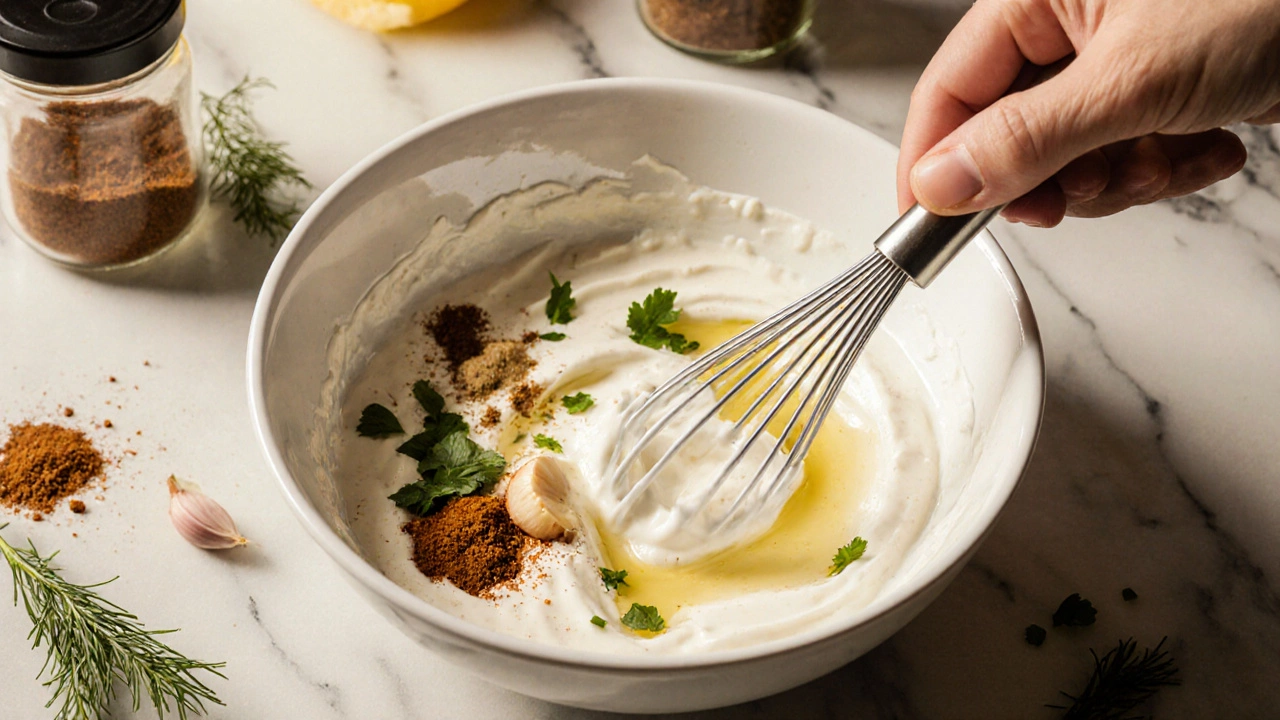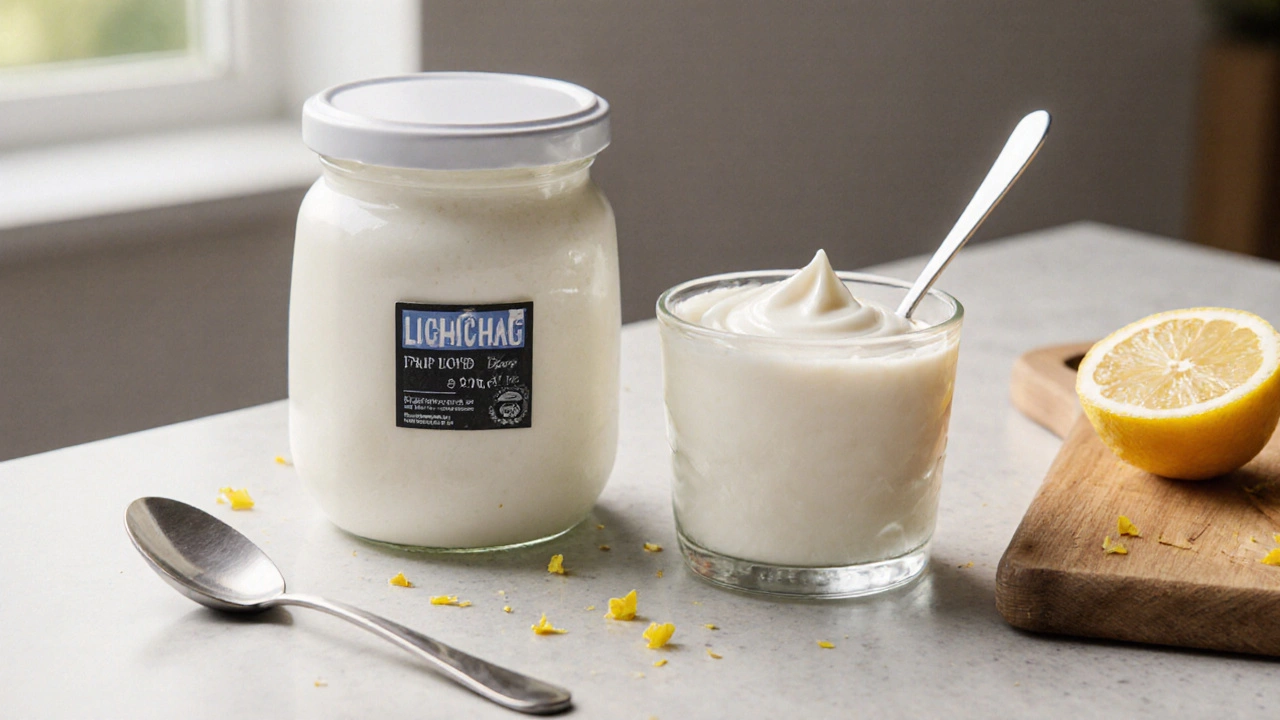Sour Cream Marinade Adjuster
Customize Your Marinade
Key Takeaways
- Sour cream can replace Greek yogurt in chicken marinades, but adjust acidity and fat levels.
- Higher fat in sour cream adds richness and keeps the meat moist.
- Add a splash of lemon juice or vinegar to boost the tenderizing power.
- Marinate for 2‑4hours for best flavor; longer times may make the texture gummy.
- Use fresh herbs, garlic, and spices to balance the tang of sour cream.
When you think about sour cream is a thick, fermented dairy product with a mild tang, the first thing that comes to mind is dolloping it on baked potatoes. But did you know it can also act as a flavorful base for chicken marinades? The question many home cooks ask is whether it can stand in for the more common Greek yogurt without compromising texture or taste.
Let’s break down the science, compare the two dairy stars, and walk through a fool‑proof method to get juicy, tangy chicken using sour cream.
What Makes a Good Marinade?
A good marinade does three things: it adds flavor, it tenderizes the protein, and it helps retain moisture during cooking. The tenderizing action mostly comes from lactic acid and enzymes that break down muscle fibers. Dairy‑based marinades, like those built on Greek yogurt or sour cream, bring both acidity and fat to the table. The acid gently denatures proteins, while the fat forms a protective coating that locks in juices.
Greek Yogurt vs. Sour Cream: The Core Differences
| Attribute | Sour Cream | Greek Yogurt |
|---|---|---|
| Typical Fat Content | 20‑30% (full‑fat) | 0‑10% (non‑fat to low‑fat) |
| Protein per 100g | 2‑3g | 10‑12g |
| pH (acidity) | ~4.5-4.8 | ~4.0-4.3 |
| Texture | Creamy, slightly thick | Thick, custard‑like |
| Flavor Profile | Mildly tangy, buttery | Bright tang, slightly nutty |
| Tenderizing Power | Moderate (acid + fat) | High (acid + protein) |
Greek yogurt scores higher on protein and acidity, which means it can cut meat fibers more aggressively. Sour cream, on the other hand, brings extra fat that adds richness and helps keep the chicken moist. The lower protein content means you won’t get as much of that "yogurt coat" effect, but the result can be a silkier, more buttery bite.

Adjusting the Sour Cream Marinade for Best Results
If you decide to go with sour cream, here are three simple tweaks to make up for the lower acidity and protein:
- Boost the Acid: Add 1‑2tablespoons of fresh lemon juice or a splash of apple cider vinegar. This raises the pH level closer to that of Greek yogurt, enhancing tenderization.
- Introduce a Small Protein Helper: Mix in a spoonful of plain low‑fat Greek yogurt or a dollop of cottage cheese. You get a protein punch without sacrificing the creamy mouthfeel.
- Season Generously: Because sour cream’s flavor is milder, layer in garlic, cumin, smoked paprika, and fresh herbs (like cilantro or dill). These aromatics will shine through the dairy base.
Step‑by‑Step: Marinating Chicken with Sour Cream
- Gather 1cup of full‑fat sour cream, 2tablespoons lemon juice, 1teaspoon smoked paprika, 1teaspoon ground cumin, 2 minced garlic cloves, 1tablespoon chopped fresh herbs, ½teaspoon salt, and ¼teaspoon black pepper.
- In a bowl, whisk together sour cream, lemon juice, spices, garlic, herbs, salt, and pepper until smooth.
- Pat dry 4‑6oz chicken thighs or breasts. Drop them into the bowl and coat evenly. The coating should cling without dripping.
- Cover the bowl with plastic wrap and refrigerate for 2‑4hours. If you’re in a hurry, 30minutes will still add flavor, but the tenderizing effect peaks after a couple of hours.
- Preheat a grill or skillet to medium‑high heat. Lightly oil the surface to prevent sticking.
- Cook the chicken 5‑7minutes per side, depending on thickness, until internal temperature reaches 165°F (74°C). The dairy crust will turn a golden‑brown, slightly caramelized.
- Let the meat rest for 3‑5minutes before slicing. This redistributes juices and keeps the bite juicy.
Tip: If you prefer a crispier exterior, finish the chicken under a broiler for 1‑2minutes after pan‑searing.
When Sour Cream Might Not Be the Best Choice
While sour cream works well for most everyday chicken dishes, there are a few scenarios where you might stick with Greek yogurt or another acid:
- High‑Heat Grilling: The extra fat can cause flare‑ups on a very hot grill. Trim excess fat from the chicken or use a indirect‑heat zone.
- Low‑Fat Diets: If you’re tracking calories, the higher fat content adds extra calories. Opt for non‑fat Greek yogurt instead.
- Flavor Profile: For recipes that rely on a sharp tang (like Middle‑Eastern shawarma), the milder sour cream may not deliver the signature zing.

Other Dairy Substitutes Worth Trying
If neither sour cream nor Greek yogurt fits the bill, consider these alternatives:
| Substitute | Acidity | Fat | Notes |
|---|---|---|---|
| Buttermilk | High | Low | Great for fried chicken; adds crispness. |
| Cottage cheese (blended) | Low | Medium | Provides protein without strong tang. |
| Crème fraîche | Moderate | High | Silky finish; works well in sauces. |
Safety and Storage Tips
Because both sour cream and Greek yogurt are perishable, keep the marinating chicken in the fridge at 40°F (4°C) or below. Never reuse the leftover marinade as a sauce unless you boil it for at least 5minutes to kill any bacteria from raw chicken.
Bottom Line
Yes, you can swap sour cream for Greek yogurt when marinating chicken, but treat it as a slightly different tool in your kitchen toolbox. Boost the acidity, balance the flavors, and respect the extra fat, and you’ll end up with tender, juicy chicken that carries a buttery undertone you won’t get from plain yogurt.
Frequently Asked Questions
Will sour cream make the chicken too heavy?
The fat in sour cream adds richness, but when used in a moderate amount (about one cup for four pieces of chicken) it won’t weigh the meat down. The key is to keep the overall marinade ratio balanced and avoid over‑coating.
How long can I marinate chicken in sour cream?
Two to four hours is ideal. Shorter than 30 minutes gives minimal flavor, while longer than 8 hours can start to break down the surface too much, resulting in a mushy texture.
Can I use low‑fat sour cream?
Low‑fat versions work, but you’ll lose some of the moisture‑locking effect. If you go low‑fat, consider adding a teaspoon of olive oil to the marinade to compensate.
Is it okay to freeze the sour cream‑marinated chicken?
Yes, you can freeze it for up to three months. Thaw in the fridge overnight before cooking to preserve texture.
What herbs pair best with sour cream in a chicken marinade?
Fresh dill, cilantro, and chives complement the tang nicely. For a deeper flavor, try a pinch of thyme or rosemary.
